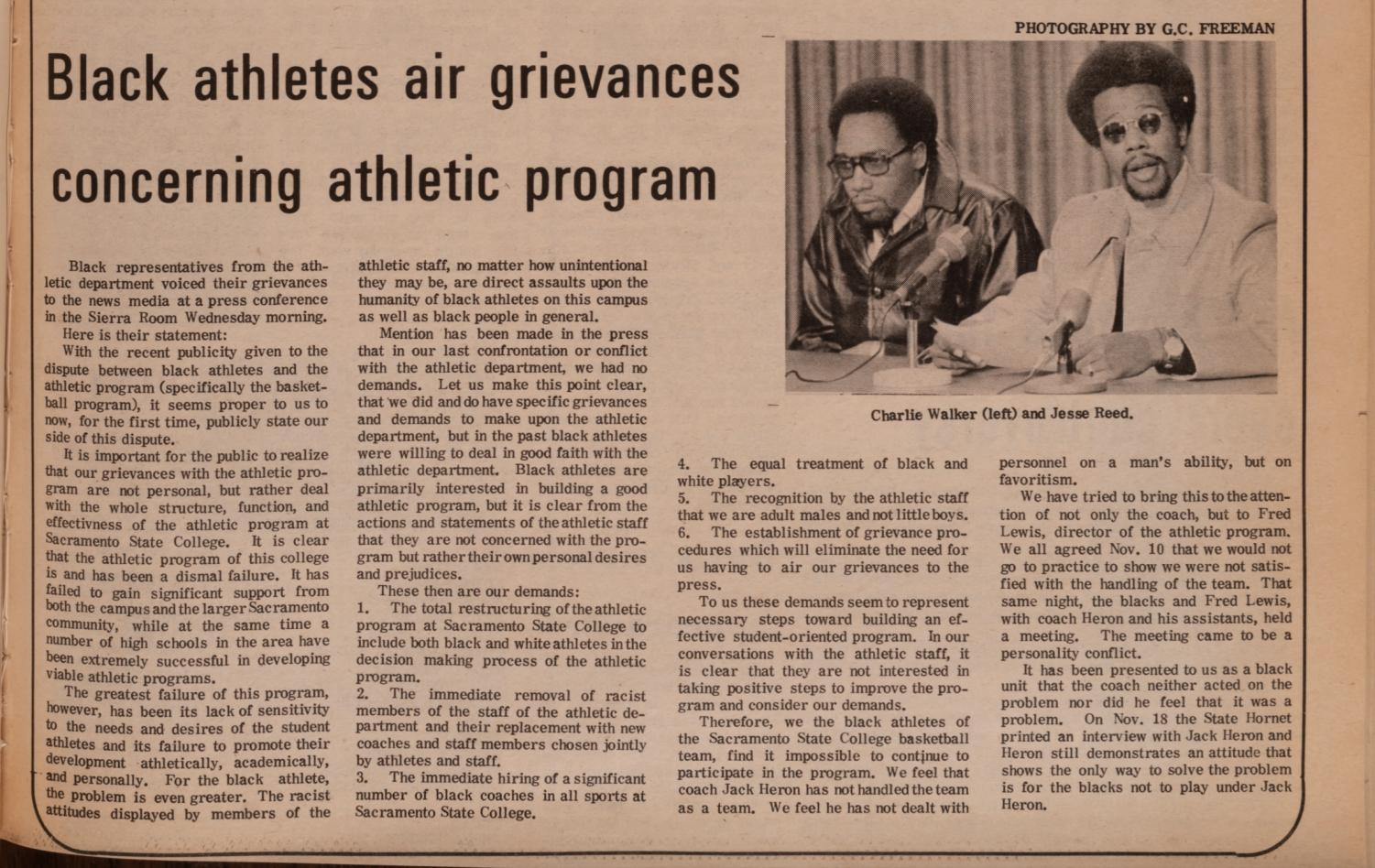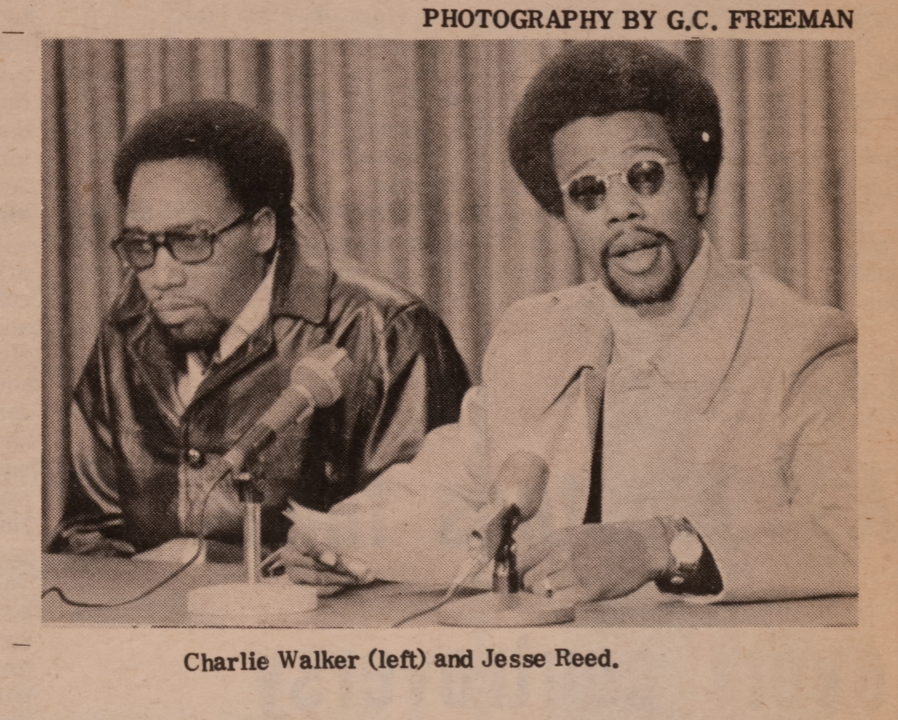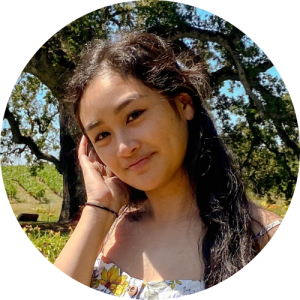FROM THE ARCHIVES: Black student athletes’ fight for social justice in Sac State athletics
File photo – The State Hornet
In a 50-year-old State Hornet story, black athletes describe how it felt being discriminated against on a college basketball team a year after the Civil Rights Movement ended. The athletes compiled a list of demands, which included the restructuring of the athletics program to include both black and white athletes in decision making.
May 17, 2019
In 1969, Sacramento State basketball players voiced their grievances against the university’s athletics department at a public press conference held on campus after experiencing prejudice and discrimination while on the team.
The team was coached by Jack Heron at the time. The disagreement on his handling of the team occurred a year after he was named head basketball coach.
The athletes shared that the greatest failure of the athletics program was its lack of sensitivity to the needs and desires of the student athletes and its failure to promote their development athletically, academically and personally. For black athletes, the problem was even greater.
“The racist attitudes displayed by members of the athletic staff, no matter how unintentional they may be, are direct assaults upon the humanity of black athletes on this campus as well as black people in general,” the representatives said in their statement.
The athletes felt that Heron didn’t handle the team as a team and that he hadn’t dealt with personnel on ability, but rather on, favoritism. They also included a list of demands.
11 days before this press conference, black members of the basketball team did not show up to practice to show that they didn’t stand for how the athletics department ran the team anymore.
That same night, a meeting was called to order which included the missing athletes, Athletics Director Fred Lewis, Heron and his assistants. Following the meeting, the representatives said that it all came to a personality conflict.
“It has been presented to us as black unit that the coach neither acted on the problem nor did he feel that it was a problem,” the representatives said.
Read the entire statement in the 50-year-old State Hornet story below to better understand how these athletes felt being on a college basketball team a year after the Civil Rights Movement ended.
The State Hornet is celebrating its 70th anniversary with stories from our archives. Below is the original article by The Hornet Staff, published Nov. 21, 1969. For more throwback content, click here.
Black athletes air grievances concerning athletic program

In a 50-year-old State Hornet story, black athletes describe how it felt being discriminated against on a college basketball team a year after the Civil Rights Movement ended. The athletes compiled a list of demands, which included the restructuring of the athletics program to include both black and white athletes in decision making.
Black representatives from the athletic department voiced their grievances to the news media at a press conference in the Sierra Room Wednesday morning.
Here is their statement:
With the recent publicity given to the dispute between black athletes and the athletic program (specifically the basketball program), it seems proper to us to now, for the first time, publicly state our side of this dispute.
It is important for the public to realize that our grievances with the athletic program are not personal, but rather deal with the whole structure, function, and effectiveness of the athletic program at Sacramento State College. It is clear that the athletic program of this college is and has been a dismal failure. It has failed to gain significant support from both the campus and larger Sacramento community, while at the same time a number of high schools in the area have been extremely successful in developing viable athletic programs.
The greatest failure of this program, however, has been its lack of sensitivity to the needs and desires of the student athletes and its failure to promote their development athletically, academically, and personally. For the black athlete, the problem is even greater. The racist attitudes displayed by members of the athletic staff, no matter how unintentional they may be, are direct assaults upon the humanity of black athletes on this campus as well as black people in general.
Mention has been made in the press that in our last confrontation or conflict with the athletic department, we had no demands. Let us make this point clear, that we did and do have specific grievances and demands to make upon the athletic department, but in the past black athletes were willing to deal in good faith with the athletic department. Black athletes are primarily interested in building a good athletic program, but it is clear from the actions and statements of the athletic staff that they are not concerned with the program but rather their own personal desires and prejudices.
These then are our demands:
- The total restructuring of the athletic program at Sacramento State College to include both black and white athletes in the decision making process of the athletic program.
- The immediate removal of racist members of the staff of the athletic department and their replacement with new coaches and staff members chosen jointly by athletes and staff.
- The immediate hiring of a significant number of black coaches in all sports at Sacramento State College.
- The equal treatment of black and white players.
- The recognition by the athletic staff that we are adult males and not little boys.
- The establishment of grievance procedures which will eliminate the need for us having to air our grievances to the press.
To us these demands seem to represent necessary steps toward building an effective student-oriented program. In our conversations with the athletic staff, it is clear that they are not interested in taking positive steps to improve the program and consider our demands.
Therefore, we the black athletes of the Sacramento State College basketball team, find it impossible to continue to participate in the program. We feel that coach Jack Heron has not handled the team as a team. We feel he has not dealt with personnel on a man’s ability, but on favoritism.
We have tried to bring this to the attention of not only the coach, but to Fred Lewis, director of the athletic program. We all agreed Nov. 10 that we would not go to practice to show we were not satisfied with the handling of the team. That same night, the blacks and Fred Lewis, with coach Heron and his assistants, held a meeting. The meeting came to be a personality conflict.
It has been presented to us as black unit that the coach neither acted on the problem nor did he feel that it was a problem. On Nov. 18 the State Hornet printed an interview with Jack Heron and Heron still demonstrates an attitude that’s show the only way to solve the problem is for the blacks not to play under Jack Heron.




































































































































Kenneth F. Stewart Sacramento State College Class of 1969 • Jun 30, 2019 at 8:46 pm
I graduated from Sacramento State College in 1969 with a degree in civil engineering. I was a member of the 1968-1969 Hornet basketball team that included most of the black players who subsequently complained about Coach Jack Heron later in 1969. This was near the height of the black power movement in the Bay Area. Even 50 years later, I can still name them all, as well as the names of all my white team mates.
My only regret about my Sac State tenure was not being in Sacramento when all the unfounded racial accusations were leveled at Jack Heron later in 1969, so that I could have testified on his behalf. This recent misleading article gives me a second chance.
I knew Jack Heron well, having played for him as a freshman as well as a senior at Sacramento State. I knew him from 1964 thru 1969. I also played against his teams in high school, when he was coach of some fine teams at La Sierra High School.
Jack Heron was a soft-spoken gentleman, and I can say without equivocation that he did not have an ounce of racism or racially motivated thought in him, either intentional or “unintentional”. For your article to portray him as anything else 50 years later is a great disservice to this fine man, who of course is not around to defend himself one again. But I am.
The “grievance” list in the article was completely unfounded.
On the 68-69 team, we had a total of about 5 blacks and 6 whites. Hardly a racially discriminatory percentage.
For a few games in the 68-69 season, I was the lone white starter in an otherwise black starting lineup. There were usually 3 or 4 black starters on the 68-69 team. Some games all 5 starters were black. Hard to call that unequal treatment, or racially motivated.
On road games, I would often room with a fine black player and friend of mine, the late Walt Slider, a great guy. No segregation there.
I knew Heron’s coaching staff that included Walt Slider’s older brother Elmo, who of course was black, and trainer Lew Crowell, who was one of the most likable and unbiased people I ever knew. The staff were all fine people….not a racially motivated person among them. Not even close. Your article makes it sound like this fine group of people were somehow racist, even Walt Slider’s brother!
I remember when one black player missed the bus to Reno for a game with Nevada and Jack Heron somehow arranged for him to be shuttled to Reno via private car. That doesn’t seem biased or discriminatory to me. I would have been left behind.
Jack Heron once expressed in a team meeting his frustration with some black players who borrowed money from him but didn’t repay it. I remember him raising his voice after a loss to a black player who shot 6 for 27 and then complained about not getting enough shots. I remember some black players smoking marijuana in hotel rooms on road trips. I remember some black players who would not speak to or make eye contact with their white team mates, me included, none of whom had any racial bias.
Mr. Heron once confided to me that he did not understand how to deal with this kind of behavior, which he had not encountered before and was completely new to him. But he never singled anyone out by race, calling everyone “players” or “team mates”….not ever “black players”, or “black team mates” or “white players”.
He treated everyone equally regardless of race. I know because I was there. The difference was some of the black players could not accept his discipline or criticism(both of which were pretty mild) and interpreted such necessary coaching actions as treating them like a “boy” instead of a “man”. I know, because I was there in the many practices when such complaints were verbalized.
I can remember being occasionally very mad at Jack Heron for not getting enough playing time, or being yanked from a game I thought I should be in, so I was not enamored with all his coaching methods. And I was not one of his favorite players.
But to infer that this man was racist in any way is an egregious mis-statement of what he was – a fine, unbiased person who had some difficult players in his first year of coaching that he was not experienced enough to deal with effectively. I know, I was there and talked to him about it.
And to infer that somehow dredging up accusations that were wrongly leveled at him 50 years ago presents some sort of important civil rights milestone is a disservice to the real civil rights milestones that were achieved in the 1960s.
I kindly ask that you publish this letter not for my sake (you can delete all references to me), but for the sake of a fine, fair man (and his staff) who was wrongly accused 50 years ago of racially biased behavior he not only did not commit, but I know was incapable of committing because of the kind of person that he was.
Sincerely
Kenneth F. Stewart
Class of 1969